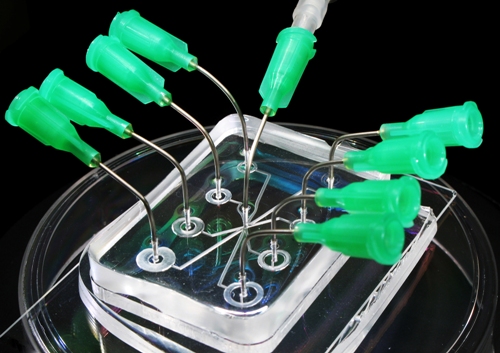In a paper, author Samuel Stavis from the National Institute of Standards and Technology (NIST) has described the necessity for the development and implementation of testing standards prior to the full commercialization of lab on a chip technology.
 A microfluidic lab on a chip device sitting on a polystyrene dish. Stainless steel needles inserted into the device serve as access points for fluids into small channels within the device, which are about the size of a human hair. (credit: Cooksey/NIST)
A microfluidic lab on a chip device sitting on a polystyrene dish. Stainless steel needles inserted into the device serve as access points for fluids into small channels within the device, which are about the size of a human hair. (credit: Cooksey/NIST)
Stavis stated that a testing standard describes the measures utilized to identify whether a lab on a chip device and the materials used for its fabrication meet criteria. Standardized testing and measurement techniques will allow MEMS lab on a chip manufacturers to precisely identify a lab on a chip device’s key physical characteristics like dimensions, temperatures, fluid flow rates, and electrical surface properties.
For this purpose, Stavis concentrates on autofluorescence, which is the background fluorescent illumination of a lab on a chip device that can affect sample analysis. Several factors, which include the materials utilized in the device, the measurement techniques utilized to test the device, and the interpretation procedure on the measurements, must be taken into account to develop a testing standard for autofluorescence. All these factors must be properly excluded from, or carefully controlled for a meaningful autofluorescence measurement.
Stavis stated that different autofluorescence tests may be required at various production stages of lab on a chip devices to ensure quality control. It may be essential to accurately measure autofluorescence at each production stage for the fabrication of lab on a chip devices with low autofluorescence.
Stavis also highlighted the significance of understanding the difference between testing standards and product standards and how the former helps the later. A product standard describes the technical specifications required for a lab on a chip device to be certified as top quality, whereas a testing standard is required to make a measurement of those specifications and fairly compare between competitive products.
Source: http://www.nist.gov